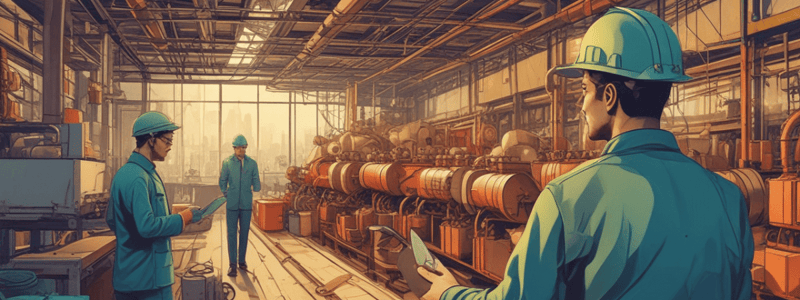Podcast
Questions and Answers
What does specialisation of labour involve?
What does specialisation of labour involve?
- Dividing a work process into a single task for all workers
- Assigning all tasks to a single worker
- Combining multiple work processes into one task
- Separating a work process into a number of tasks, with each task carried out by a separate worker or group of workers (correct)
What is an advantage of specialisation of labour?
What is an advantage of specialisation of labour?
- Increased career progression opportunities
- Lower training costs (correct)
- Less efficient production
- Higher staff morale
What is a potential disadvantage of specialisation of labour?
What is a potential disadvantage of specialisation of labour?
- Higher training costs
- Higher staff morale
- Repetitive tasks leading to decreased staff morale (correct)
- Increased productivity
What is another consequence of specialisation of labour?
What is another consequence of specialisation of labour?
Why might a worker who is specialised in a particular task struggle to find alternative employment?
Why might a worker who is specialised in a particular task struggle to find alternative employment?
What is the fundamental concept represented by the idea of scarcity?
What is the fundamental concept represented by the idea of scarcity?
What is the opportunity cost of a decision?
What is the opportunity cost of a decision?
Which of the following statements is true about unlimited wants?
Which of the following statements is true about unlimited wants?
What is the main reason for the existence of scarcity?
What is the main reason for the existence of scarcity?
What happens when individuals make a choice?
What happens when individuals make a choice?
Which aspect of unemployment is studied in microeconomics?
Which aspect of unemployment is studied in microeconomics?
What is the primary focus of macroeconomics?
What is the primary focus of macroeconomics?
In which field of study would you analyse the decisions of governments and countries?
In which field of study would you analyse the decisions of governments and countries?
What is the key difference between microeconomics and macroeconomics?
What is the key difference between microeconomics and macroeconomics?
In the context of unemployment, which level of analysis is concerned with the factors affecting an individual's decision to apply for a job?
In the context of unemployment, which level of analysis is concerned with the factors affecting an individual's decision to apply for a job?
Flashcards are hidden until you start studying
Study Notes
Specialisation of Labour
- Separation of a work process into multiple tasks, each carried out by a separate worker or group of workers.
Advantages of Specialisation
- Increased efficiency: each unit produced at a lower cost per unit, with no time wasted.
- Improved productivity: workers get better at their tasks, leading to higher output and profits.
- Reduced training costs: employees only need to learn a narrow range of tasks.
Disadvantages of Specialisation
- Repetitive tasks can lead to decreased staff morale and motivation, resulting in decreased productivity.
- Limited career progression opportunities for individual workers.
- Narrow skill set makes it difficult for workers to find alternative employment if they become unemployed.
Microeconomics vs Macroeconomics
- Microeconomics focuses on the behavior and decisions of individuals and firms.
- It analyzes individual economic units, such as households, businesses, and markets.
- In microeconomics, the study of unemployment involves examining the factors that influence an individual's decision to apply for a job.
Macroeconomics
- Macroeconomics examines the behavior and decisions of governments and countries.
- It studies the economy as a whole, looking at aggregate variables such as national income, employment, and inflation.
- In macroeconomics, the study of unemployment involves analyzing government policies that can lead to a general decline in unemployment across the country.
Specialisation of Labour
- Separation of a work process into multiple tasks, with each task carried out by a separate worker or group of workers
- Advantages:
- Increased efficiency: each unit produced at a lower cost per unit, with no time wasted
- Improved productivity: workers become better at their tasks, output increases, and profits rise
- Lower training costs: employees only need to learn a narrow range of tasks
- Disadvantages:
- Repetitive tasks lead to decreased staff morale and motivation, reducing productivity
- Limited career progression opportunities for individual workers
- Narrow skill set makes it harder for workers to find alternative employment if unemployed
Scarcity and Opportunity Cost
- Scarcity: the gap between limited resources and unlimited wants
- Opportunity cost: the best alternative given up when a choice is made
Microeconomics vs Macroeconomics
- Microeconomics:
- Analyzes the behaviour and decisions of individuals and firms
- Examines specific factors influencing individual choices, such as job application decisions
- Macroeconomics:
- Studies the behaviour and decisions of governments and countries
- Examines the economy as a whole, including policies affecting national unemployment rates
Studying That Suits You
Use AI to generate personalized quizzes and flashcards to suit your learning preferences.




